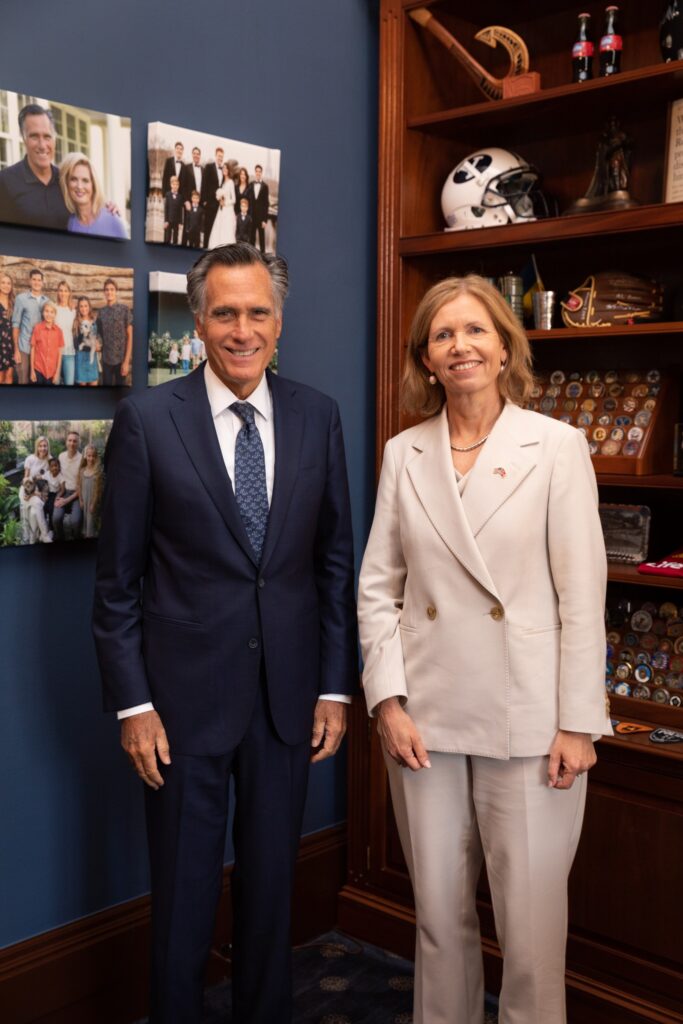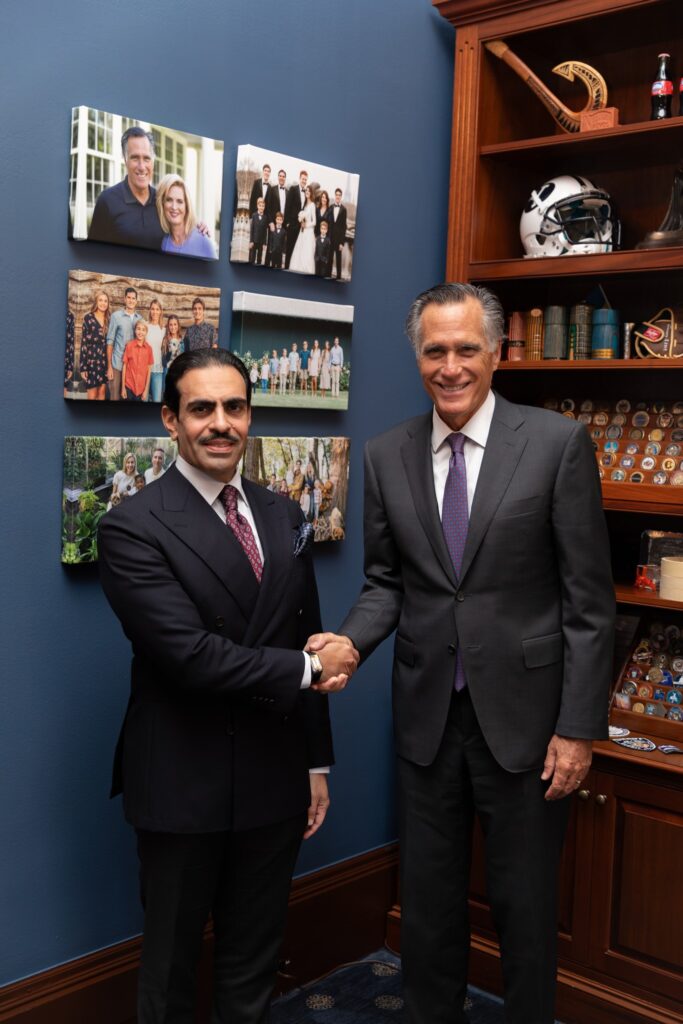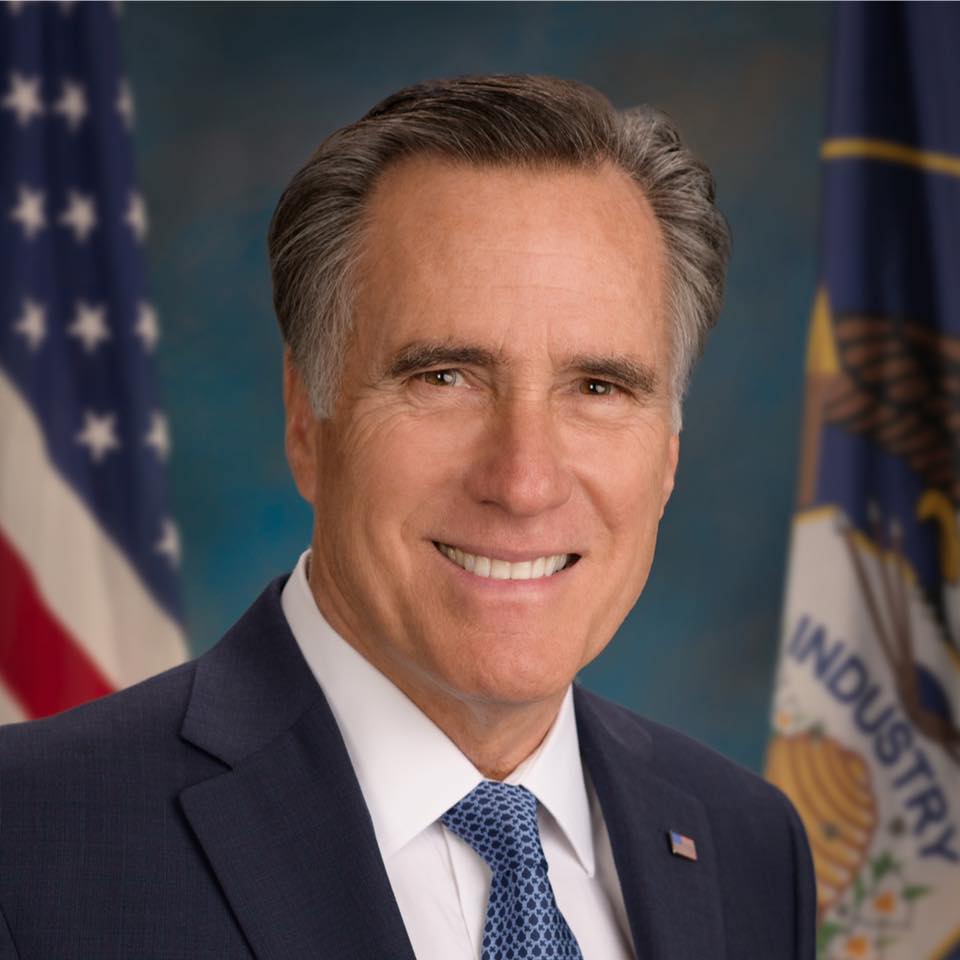Mitt Romney is a prominent American businessman, politician, and former Massachusetts Governor whose financial success has made him one of the wealthiest members of the U.S. Senate. Mitt Romney net worth is estimated at $300 million in 2025, accumulated primarily through his groundbreaking work in private equity and strategic investments.
From co-founding Bain Capital to running for president twice, Romney’s journey from business executive to political leader represents a unique American success story. His wealth, political career, and personal values have shaped decades of public service while maintaining financial independence that few politicians can claim.
Table of Contents
Quick Bio, Wiki about Mitt Romney net worth
| Category | Details |
|---|---|
| Full Name | Willard Mitt Romney |
| Date of Birth | March 12, 1947 |
| Age | 78 years old |
| Birthplace | Detroit, Michigan, USA |
| Current Net Worth | $300 million (2025) |
| Wealth Source | Bain Capital, Private Equity Investments |
| Occupation | Businessman, Politician (Retired) |
| Political Party | Republican |
| Positions Held | • U.S. Senator from Utah (2019-2024)<br>• Governor of Massachusetts (2003-2007)<br>• Presidential Nominee (2012) |
| Education | • Harvard Law School (JD, 1975)<br>• Harvard Business School (MBA, 1975)<br>• Brigham Young University (BA English, 1971) |
| Spouse | Ann Romney (m. 1969) |
| Children | 5 sons (Taggart, Matthew, Joshua, Benjamin, Craig) |
| Religion | The Church of Jesus Christ of Latter-day Saints (Mormon) |
| Notable Companies | • Bain Capital (Co-founder, 1984)<br>• Bain & Company (Vice President) |
| Books Published | • “Turnaround” (2004)<br>• “No Apology” (2010) |
| Residence | Park City, Utah |

How Much is Mitt Romney Worth in 2025?
Mitt Romney net worth stands at approximately $300 million as of 2025, making him one of the richest politicians in American history. This figure comes from multiple financial disclosure forms filed during his political campaigns and Senate service.
Unlike many wealthy politicians who inherited their fortunes, Romney built his wealth through business acumen and investment expertise. His fortune stems primarily from his 25-year tenure at Bain Capital, where he and his partners generated extraordinary returns through leveraged buyouts and corporate restructuring.
Financial Disclosure Timeline
Romney’s wealth has been well-documented through mandatory financial disclosures:
- 2012 Presidential Campaign: Financial forms estimated his net worth between $80 million and $255 million
- 2012 IRA Value: His retirement account alone held $102 million
- 2018 Senate Campaign: Disclosures showed wealth ranging from $190 million to $250 million
- 2010-2011 Income: Tax records revealed he earned $42.7 million over two years
- 2015-2017 Income: Tax returns showed $83.8 million in earnings
These figures demonstrate consistent wealth accumulation even after leaving active business management in 1999.
Early Life: Growing Up in a Political Family
Mitt Romney was born on March 12, 1947, in Detroit, Michigan, into a family already familiar with business and politics. His father, George Romney, was a successful automobile executive who later became Governor of Michigan and ran for president in 1968.
Family Background and Influence
Growing up as the youngest of four children, Romney witnessed firsthand how business success could translate into political influence. His mother, Lenore Romney, was a homemaker who also ran for U.S. Senate in 1970. This unique upbringing in a family that valued both entrepreneurship and public service shaped Romney’s future path.
The family moved to Bloomfield Hills, Michigan, in 1953 when George became CEO of American Motors Corporation. This environment of business leadership and political ambition created the foundation for Romney’s dual career in business and politics.
Education and Mormon Mission
Romney attended Cranbrook School, an elite preparatory school, where he participated in hockey, cross-country running, and the pep squad. After graduating, he enrolled at Stanford University but left after one year for a Mormon missionary trip to France.
During his mission in 1968, Romney experienced a life-changing event when the car he was driving was hit by another vehicle. The mission president’s wife was killed in the accident, and Romney himself was seriously injured. This tragedy deepened his faith and commitment to service.
Upon returning to the United States, Romney completed his Bachelor of Arts in English at Brigham Young University in 1971. He then pursued a joint Juris Doctor and Master of Business Administration at Harvard University, graduating cum laude from law school and finishing in the top 5% of his business school class in 1975.
Building Wealth: Romney Business Career
Boston Consulting Group (1975-1977)
Romney launched his professional career at Boston Consulting Group as a management consultant. This position provided crucial experience in corporate strategy, financial analysis, and business operations—skills that would prove invaluable in his later ventures.
Bain & Company (1977-1984)
In 1977, Romney joined Bain & Company, a management consulting firm founded by Bill Bain. His analytical abilities and work ethic quickly earned recognition, and he became vice president by 1978. At Bain & Company, Romney specialized in helping struggling companies improve operations and profitability.
Founding Bain Capital: The Wealth Engine
The pivotal moment in Romney’s financial journey came in 1984 when he co-founded Bain Capital, a private equity investment firm. This venture would become the primary source of his vast fortune.
How Bain Capital Generated Wealth
Bain Capital pioneered a sophisticated approach to private equity:
- Leveraged Buyouts: The firm acquired controlling stakes in companies using borrowed money
- Operational Improvements: They implemented strategic changes to increase profitability
- Strategic Exits: Companies were sold or taken public when values peaked
Over 25 years, Romney and his partners invested in and transformed numerous companies, including:
- Staples (office supplies)
- Sports Authority
- Domino’s Pizza
- Sealy Corporation
- Steel Dynamics
By the time Romney left Bain Capital in 1999, the firm managed over $4 billion in assets. Romney’s personal stake and profit-sharing agreements had generated hundreds of millions in wealth.
Investment Strategy and Returns
Romney’s investment approach emphasized:
- Thorough due diligence and research
- Long-term value creation over quick profits
- Active involvement in portfolio companies
- Diversification across industries
- Patient capital deployment
This disciplined strategy produced annual returns that significantly outpaced market averages, multiplying his initial investments many times over.

Political Career: From Governor to Presidential Nominee
1994 Senate Race: Early Political Ambition
Romney’s first political campaign came in 1994 when he challenged Ted Kennedy for his Massachusetts Senate seat. Despite investing heavily in the race, Romney lost to the incumbent Kennedy, who had held the seat since 1962. This defeat taught Romney valuable lessons about campaigning and public perception.
2002 Winter Olympics: Turning Point
Before entering electoral politics again, Romney took leadership of the 2002 Salt Lake City Olympic Games Organizing Committee. The games faced financial difficulties and corruption scandals. Romney successfully turned the situation around, balancing budgets and restoring credibility—achievements that boosted his political profile significantly.
Governor of Massachusetts (2003-2007)
In 2002, Romney won election as Governor of Massachusetts, serving from 2003 to 2007. Notably, he declined the $130,000 annual gubernatorial salary, a decision possible only because of his substantial personal wealth.
Key accomplishments included:
- Healthcare reform (the model for later national legislation)
- Balanced state budget
- Business-friendly economic policies
- Education improvements
2008 Presidential Campaign
Romney first sought the Republican presidential nomination in 2008 but lost to John McCain. This campaign required substantial personal spending and introduced him to national audiences.
2012 Presidential Race
Romney secured the Republican nomination in 2012, choosing Paul Ryan as his running mate. His campaign emphasized:
- Business experience and economic expertise
- Job creation proposals
- Criticism of President Obama’s policies
Despite strong support from business communities, Romney lost to Barack Obama, receiving 206 electoral votes compared to Obama’s 332.
Utah Senate (2018-2024)
In 2018, Romney ran for Senate in Utah, winning decisively with 62.6% of the vote. As senator, he distinguished himself by voting to convict President Donald Trump during impeachment proceedings—the only Republican senator to do so in the first trial.
Romney announced his retirement from the Senate in 2023, ending his formal political career in 2024.
Breaking Down Romney’s $300 Million Fortune
Investment Portfolio
The bulk of Romney’s wealth remains in diversified investment portfolios:
- Private equity holdings: Continuing returns from Bain Capital investments
- Stock market investments: Blue-chip companies and index funds
- Bonds and securities: Government and corporate bonds for stability
- Retirement accounts: His IRA alone was valued at $102 million in 2012
Real Estate Holdings
Romney and his wife Ann own an impressive real estate portfolio worth tens of millions:
La Jolla, California:
Purchased beachfront property for $12 million in 2008, demolished it, built an 8,000-square-foot mansion, and sold it for $23.5 million in July 2021—an $11.5 million profit.
Park City, Utah:
A $9 million mansion serving as their primary residence, strategically located near family and outdoor recreation.
New Hampshire:
An 11-acre lakefront estate valued at approximately $10 million, used for family gatherings.
Boston, Massachusetts:
A townhouse in Boston for convenience during political activities.
Combined, these properties represent $40-50 million in real estate assets.
Income Sources
Romney’s annual income derives from multiple streams:
- Investment dividends and capital gains
- Book royalties from “Turnaround” (2004) and “No Apology” (2010)
- Speaking fees (before entering Senate)
- Pension benefits from Massachusetts governorship
- Senate salary of $174,000 (2019-2024)
His tax returns show effective tax rates around 14% because income comes primarily from capital gains, which are taxed at lower rates than ordinary income.
Charitable Giving: Romney’s Philanthropy
Despite his wealth, Romney has demonstrated significant charitable commitment. Between 2015 and 2017 alone, Mitt and Ann Romney donated $11 million to charity.
Primary Charitable Focus
The Church of Jesus Christ of Latter-day Saints:
As a devout Mormon, Romney has tithed consistently throughout his life, donating 10% of his income to the LDS Church. This practice has contributed tens of millions over his lifetime.
Tyler Foundation:
A Romney-controlled foundation supporting various causes including:
- Education initiatives
- Medical research
- Community development
Other Beneficiaries:
- Multiple Sclerosis research (Ann Romney has MS)
- Best Friends Foundation
- Various educational institutions
- Local Utah charities
How Romney Compares to Other Wealthy Politicians
Romney ranks among the richest current and former U.S. politicians:
Wealthiest Current Congress Members (2024):
- Rep. Darrell Issa (R-CA) – $460 million
- Sen. Rick Scott (R-FL) – $300 million
- Sen. Mark Warner (D-VA) – $300 million
- Mitt Romney (R-UT) – $300 million
- Rep. Scott Peters (D-CA) – $200 million
Self-Made vs. Inherited Wealth
Unlike some wealthy politicians who inherited fortunes, Romney built his wealth through:
- Strategic business decisions
- Investment expertise
- Risk-taking in private equity
- Long-term value creation
While his father provided educational opportunities and connections, the vast majority of Romney’s fortune came from his own business success at Bain Capital.
Personal Life and Family Values
Marriage to Ann Romney
Mitt married Ann Davies on March 21, 1969, shortly after returning from his Mormon mission. They met in high school, and their relationship has spanned over 55 years. Ann converted to Mormonism in 1966 and was baptized by Mitt’s father.
Five Sons and Growing Family
The Romneys raised five sons:
- Taggart (born 1970)
- Matthew (1971)
- Joshua (1975)
- Benjamin (1978)
- Craig (1981)
Their family now includes numerous grandchildren, and family gatherings at their New Hampshire estate remain a priority.
Health Challenges
Both Mitt and Ann have faced serious health issues:
- Ann: Diagnosed with multiple sclerosis in 1998, which has shaped their charitable focus
- Mitt: Successfully treated for prostate cancer in 2017 at UC Irvine Hospital
These challenges have deepened their commitment to medical research funding.
Mormon Faith and Service
Romney has held significant leadership positions in the LDS Church:
- Seminary teacher
- Bishop of his ward
- President of the Boston Stake
His faith has influenced his business ethics, political positions, and charitable giving throughout his life.
Romney’s Views on Wealth and Success
Throughout his career, Romney has articulated specific views about wealth creation:
On Business Success:
Romney believes private enterprise drives prosperity and job creation more effectively than government programs.
On Taxation:
He has advocated for lower capital gains taxes, arguing they encourage investment and economic growth. Critics note this benefits wealthy individuals like himself.
On Giving Back:
Romney consistently emphasizes the importance of charitable giving and community service, practicing what he preaches through substantial donations.
On Work Ethic:
He credits his success to hard work, education, and willingness to take calculated risks—not simply privilege or luck.
Life After Senate: What’s Next for Romney?
Following his Senate retirement in January 2024, Romney, now 78, has several options:
Potential Activities:
- Writing and Speaking: Memoir or political commentary books; speaking engagements on leadership and politics
- Consulting: Advisory roles for businesses or political organizations
- Philanthropy: Increased focus on charitable work and foundation management
- Family Time: More time with grandchildren and at family properties
- Religious Service: Continued involvement in LDS Church activities
Romney’s financial independence means he can pursue interests without economic pressure, allowing him to focus on legacy and impact.

Frequently Asked Questions About Mitt Romney net worth
How did Mitt Romney make his money?
Romney built his $300 million fortune primarily through co-founding and leading Bain Capital, a private equity firm, from 1984 to 1999. His investments and profit-sharing from successful buyouts generated the bulk of his wealth.
Did Romney inherit his wealth?
No. While Romney’s father George was successful, Mitt built his fortune independently through his business career. His father provided education and connections but not his wealth.
What is Mitt Romney’s salary?
As a U.S. Senator (2019-2024), Romney earned the standard Senate salary of $174,000 annually. As Massachusetts Governor, he declined his $130,000 salary.
How much does Romney pay in taxes?
Romney’s tax returns show an effective tax rate around 14% because his income comes primarily from capital gains and dividends, which are taxed at lower rates than ordinary income.
What is Romney’s most valuable asset?
His investment portfolio, particularly his IRA retirement account (valued at $102 million in 2012) and continued Bain Capital holdings, represent his most valuable assets.
Is Mitt Romney the richest senator?
Romney was among the wealthiest senators during his tenure (2019-2024), typically ranking in the top 3-5, though exact rankings vary by year and valuation methods.
Conclusion About Mitt Romney net worth
Mitt Romney net worth of $300 million represents more than just financial success—it embodies a unique combination of business innovation, political service, and personal values. From revolutionizing private equity at Bain Capital to serving as Governor and Senator, Romney has leveraged his wealth to pursue public service without financial constraints.
His story offers lessons in entrepreneurship, strategic investing, and the complexities of wealth in American politics. Whether viewed as a business success story or a wealthy politician out of touch with average Americans, Romney’s financial journey remains a significant chapter in American business and political history.
As he enters retirement, Romney’s legacy will be judged not just by the fortune he accumulated, but by how he used his wealth, influence, and platform to impact society. His charitable giving, political courage, and family values demonstrate that wealth, when combined with principle, can serve purposes beyond personal enrichment.
For those interested in building wealth through business, understanding political finance, or learning from successful entrepreneurs, Romney’s career provides valuable insights into the intersection of money, power, and public service in modern America.
